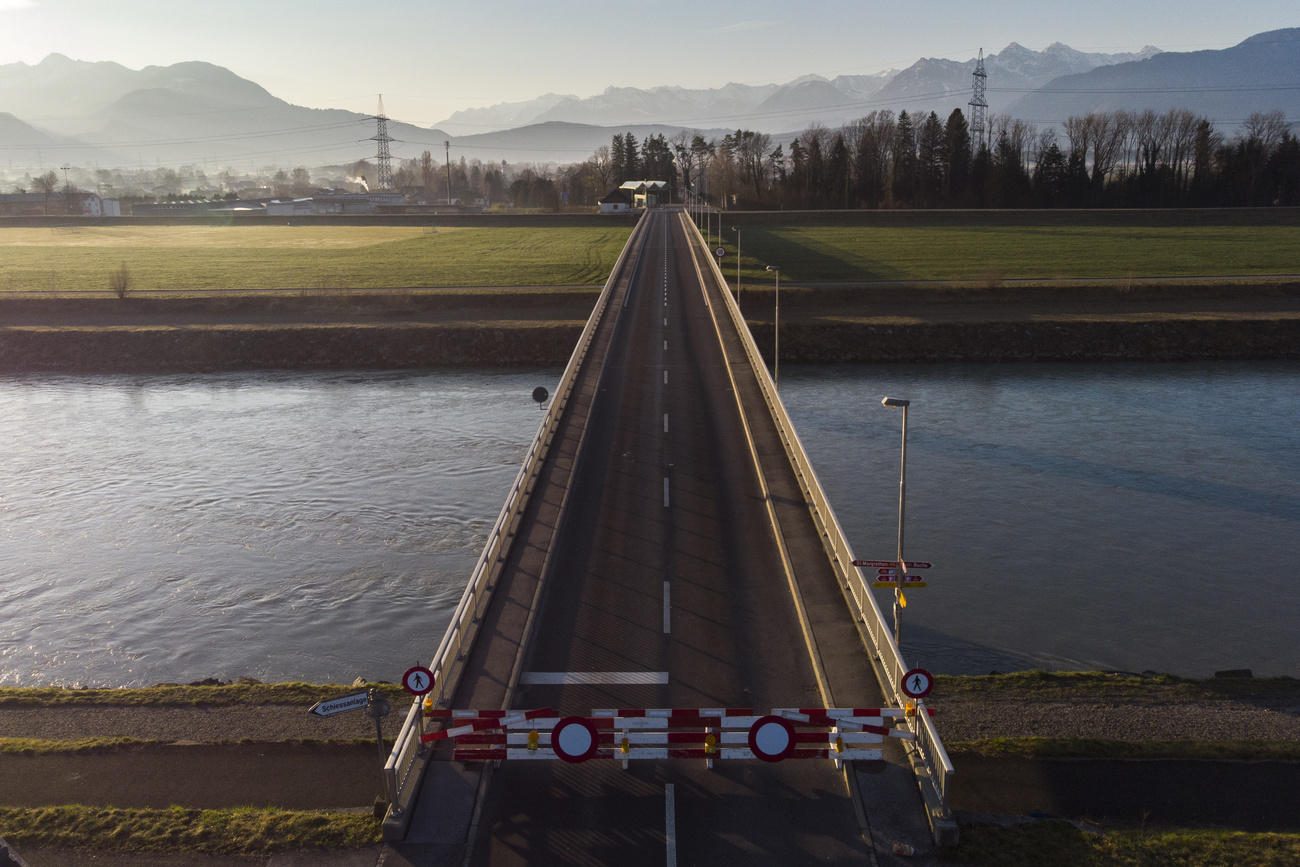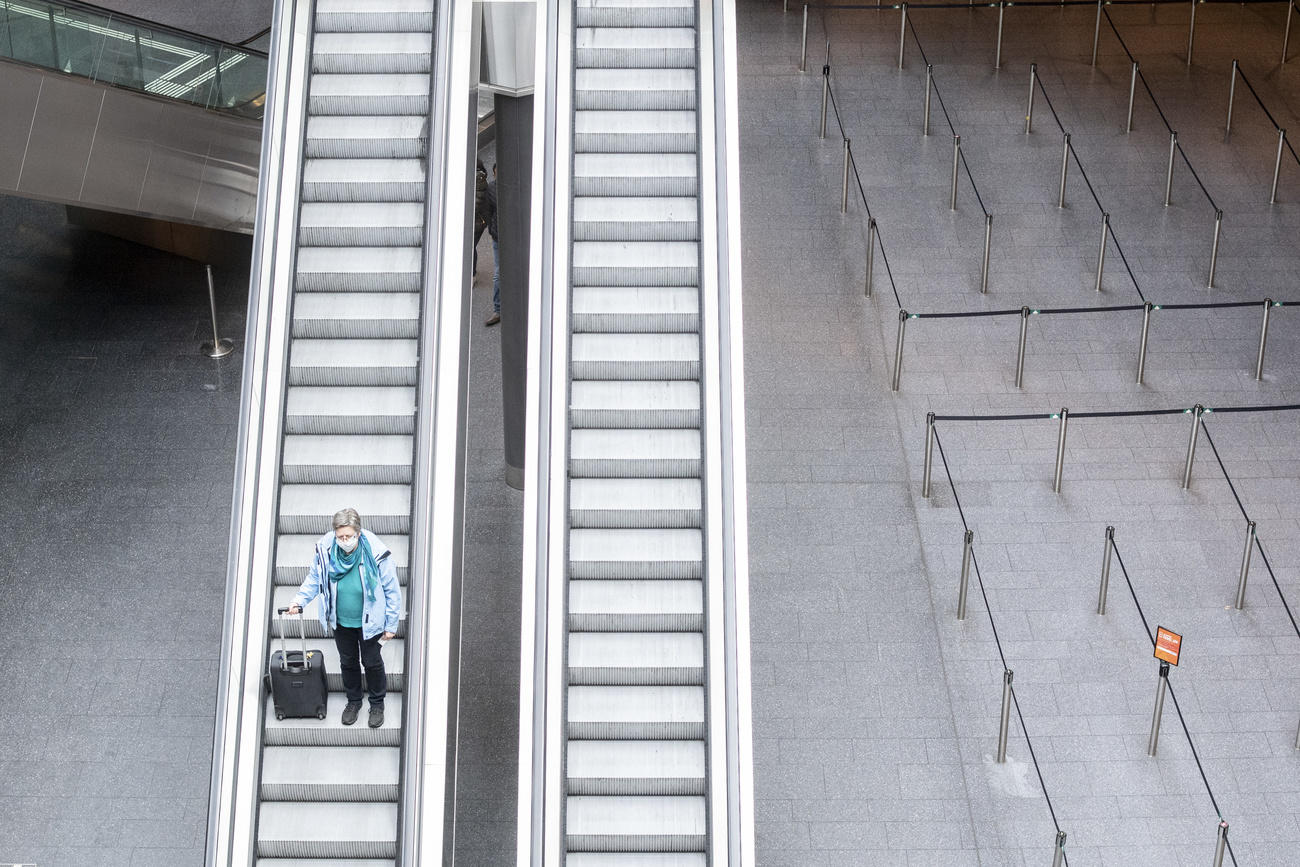What to expect at Swiss borders and airports

Who can still enter the country? Who is being turned away? What do you do if you have a flight booked to Switzerland next week? An overview of the latest border situation.
Editors' note - this story is current as of March 19; you can find continuous updates of the border situation here.
The Swiss government earlier this week introduced wide-ranging checks at land borders with surrounding Austria, France, and Germany, after previously having done so last week with Italy.
Only Swiss citizens, Swiss residents, those entering the country for professional reasons (e.g., those who work here and have a permit to prove it), and those transiting through, can enter. Even foreign partners of Swiss citizens, who do not have a right of residence in the country, will be turned away.
On Wednesday, the restrictions were ramped up againExternal link: travellers arriving by air from the four neighbouring countries are now also unwelcome, as are people coming from Spain, along with those from outside the Schengen visa-free area.
What has this meant concretely?
On the roads, it has meant a significant drop in the number of people entering the country; by up to 70% compared to a month ago, according to figures given on Thursday by the Federal Customs Administration (FCA). This number is even higher for the Italian border with canton Ticino, which was the first to introduce checks and start closing some posts.
But it has not led to a situation of deserted frontiers. In many places, it has been the opposite, at least initially. Long traffic jams due to the checks meant that some cross-border workers coming from France were taking several hours to complete a journey normally done in 45 minutes, ReutersExternal link reported on Tuesday.
In the southwestern canton of Geneva, where some 60% of nurses are French, a new system of car stickers was quickly introduced for those working in the health, emergency services or policing sectors. These workers were then funnelled into priority lanes – a “green lane” system which is now being rolled out at all border crossings, says FCA head Christian Bock.

More
Coronavirus: the situation in Switzerland
The Tribune de Genève newspaper, meanwhile, reportedExternal link from some border points that while some people were being turned back for not having the proper residence or work papers – including in cross-border trams – most people were simply experiencing delays, and most were understanding about it.
On Thursday, Bock confirmed that 11,000 people have been turned back since the closures came into force. Several attempts had also been made to break through the border, he said, mostly in the northwest region, but none were successful.
Finally, according to the FCA, some 130 border postings have been closed completely as of Thursday – often smaller postings, shut down in order to facilitate the work of border guards by channelling traffic through fewer, but bigger, crossing points.

What’s happening at airports?
At airports, the situation has been described as strangely calmExternal link, what with cancelled flights, closed shops and entry restrictions disrupting the normal rhythms of international travel. Swiss International Airlines has reported grounding 24 of its planes at a military airfield outside Zurich, since they’re not being used. One trade union has called for the complete closure of Geneva airport.
That said, on Thursday morning, plenty of flights were still announcedExternal link as having landed at Zurich airport, including from Rome, Paris, Frankfurt, and Madrid. However, according to the restrictions introduced the previous evening, anyone on flights from such destinations who is not a Swiss citizen or resident, coming for work or transiting through would not be allowed into the country, “except in a situation of absolute necessity”.
What happens to those not meeting the entry requirements?
The government writes that authorities at airports would be “introducing measures” to enforce the new rules, but didn’t specify further. A Zurich airport police spokesperson told swissinfo.ch on Thursday that the “normal procedures” apply – that is, papers are checked, and somebody denied entry will be accompanied to a transfer desk, with the responsibility for covering the return flight falling on the airline involved.
However, no statistics were available on how many such cases had occurred thus far.
What about those with travel plans to Switzerland?
In sum, unless you are Swiss or live in Switzerland, the places from which you can now fly into the Alpine nation have shrunk to the 26 Schengen Area countries, minus Austria, France, Germany, Italy and Spain. If you do fly from one of these countries, you should make sure you’ll be able to get back there again, since many nations have introduced their own restrictions, and quarantine requirements, on who can enter, and from where.
As for Swiss citizens or residents coming home from other countries with high rates of positive coronavirus cases, quarantine is currently not being enforced. The Federal Office of Public Health writes in its Covid-19 overviewExternal link that “there is now a risk of becoming infected with the new coronavirus in almost all parts of the world. As of 9 March we will therefore no longer be referring to ‘affected areas’.”
The foreign ministry, meanwhile, has called on Swiss citizens currently travelling abroad to try and come back as soon as possible, since mounting cancellations and border closures can lead to tricky diplomatic situations, such as that in Morocco earlier this week (now resolved). It is not known how many Swiss tourists are still stuck abroad, or searching for routes home. Some 15,000 are registered on the foreign ministry’s Itineris platformExternal link, an online registration for citizens travelling abroad.
Finally, under the Swiss Abroad ActExternal link, the foreign ministry has reiterated several times that nationals abroad cannot claim the right to an organised departure from a crisis area. The ministry and its embassies will provide citizens abroad with assistance in crisis situations as much as they can, it says. But no mass repatriation is in the works.

In compliance with the JTI standards
More: SWI swissinfo.ch certified by the Journalism Trust Initiative











You can find an overview of ongoing debates with our journalists here . Please join us!
If you want to start a conversation about a topic raised in this article or want to report factual errors, email us at english@swissinfo.ch.